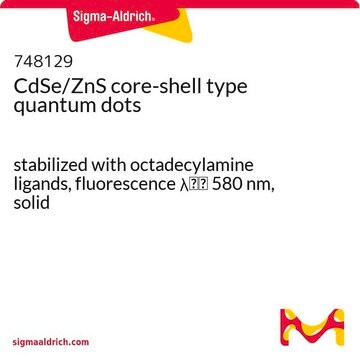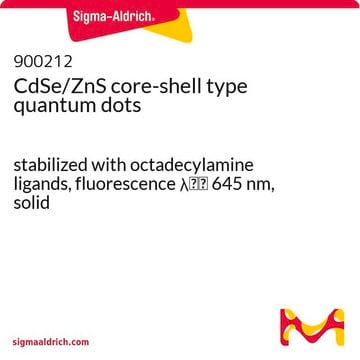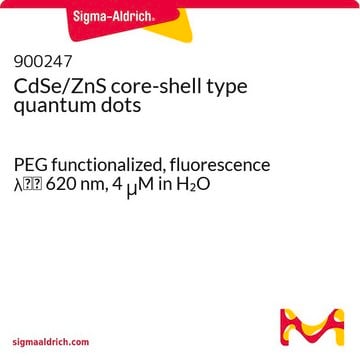推薦產品
應用
Protocol to make QD solutions (dispersing QDs into solutions):
1. Weigh desired amount of the quantum dot powder and put it in a glass vial;
2. Add desired amount of the solvent, i.e. toluene, chloroform, hexane, etc. (mostly non-polar organic solvents) in the vial and shake the vial;
3. If there is any solid left in the vial after shaking, sonicate the vial for 30~60 seconds to get the quantum dot powder well dispersed. If required dilute the solution further.
Material has a shelf life of around 3 years if stored properly. Store at room temperature (4-25 °C); do not freeze. Should not be exposed to extreme temperatures.
法律資訊
訊號詞
Danger
危險分類
Acute Tox. 4 Inhalation - Acute Tox. 4 Oral - Aquatic Acute 1 - Aquatic Chronic 1 - Eye Dam. 1 - Skin Irrit. 2 - STOT RE 2 - STOT RE 2 Oral
標靶器官
Kidney,Bone, Liver,Gastrointestinal tract,Immune system
安全危害
儲存類別代碼
11 - Combustible Solids
水污染物質分類(WGK)
WGK 3
閃點(°F)
Not applicable
閃點(°C)
Not applicable
分析證明 (COA)
輸入產品批次/批號來搜索 分析證明 (COA)。在產品’s標籤上找到批次和批號,寫有 ‘Lot’或‘Batch’.。
文章
Dye-sensitized solar cells as a promising, low-cost photovoltaic technology.
Professor Sharma and colleagues review the synthesis and applications of this novel material. This includes a discussion of the unique properties of quantum dots and their suitability for solar cell applications, along with common synthesis techniques used to develop these materials.
Professor Xiaohu Gao (University of Washington, USA) provides a overview of recent quantum dot (QD) advancements and their potential for advancing bioassay and bioimaging technologies.
Perovskite quantum dots research progresses overcoming challenges, enabling rapid development of light-emitting devices.
我們的科學家團隊在所有研究領域都有豐富的經驗,包括生命科學、材料科學、化學合成、色譜、分析等.
聯絡技術服務



![三[2-(甲氨基)乙基]胺 97%](/deepweb/assets/sigmaaldrich/product/structures/217/368/3e89e134-669e-4a03-9a34-f97b50399bb2/640/3e89e134-669e-4a03-9a34-f97b50399bb2.png)





